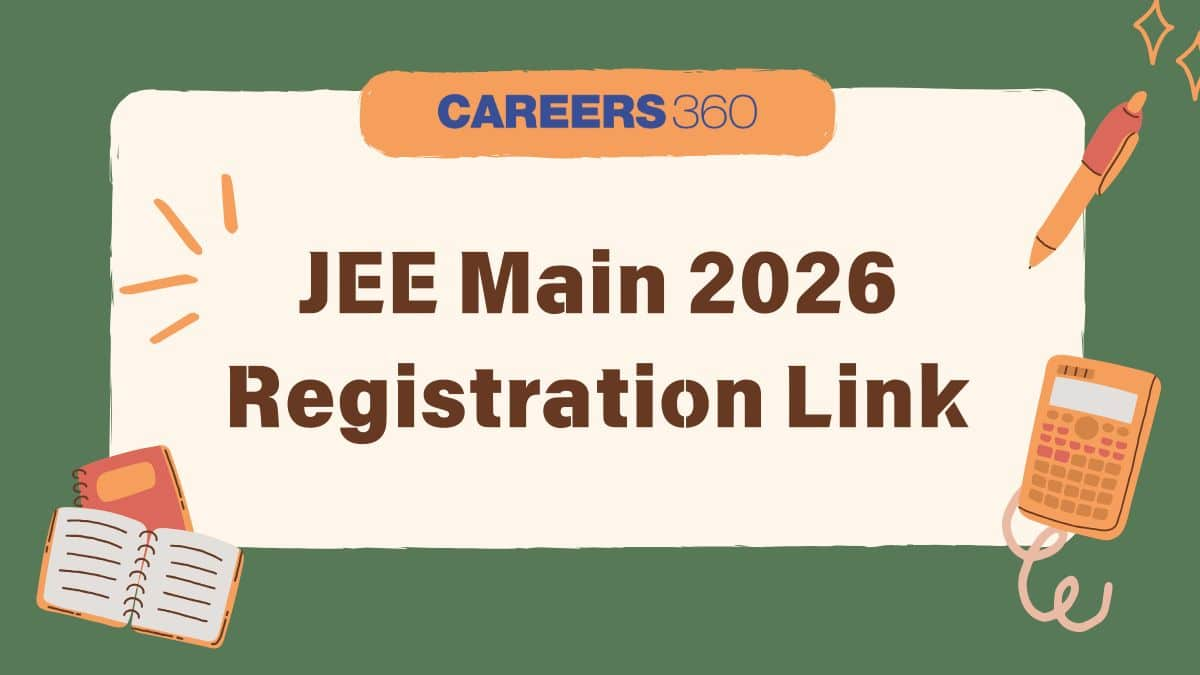Amity University-Noida B.Tech Admissions 2026
Among top 100 Universities Globally in the Times Higher Education (THE) Interdisciplinary Science Rankings 2026
JEE Main 2026 Registration Link: The National Testing Agency has activated the JEE Main 2026 session 2 registration link on February 1, 2026. The JEE Main 2026 April session application form is now available on the official website, jeemain.nta.nic.in. Before beginning the process of filling out the online application form, candidates are advised to carefully read the Information Bulletin and Admissions Guidelines 2026. All candidates who submit the online JEE Main 2026 application form and pay the examination fee before February 25, 2026, will be eligible to appear for the entrance exam, and their admit cards will be uploaded on the website. The authority will conduct the JEE Main 2026 exam session 2 from April 2 to 9, 2026. Read the article to know when and where to access the JEE Mains registration link.
Direct Link to Registers for JEE Main 2026 session 2 exam
Enrolled applicants should anticipate to receive exam city intimation slips in the second week of March 2026.
This Story also Contains

JEE Main 2026 Registration Link
The authority will activate the session 2 JEE Main registration 2026 link online. Below are the dates to access the JEE Main registration link online as per the official notification.
| Event | Dates |
|---|---|
Start of JEE Mains session 2 registration | February 1, 2026 |
| Last date to submit the JEE forms | February 25, 2026 |
Release of JEE Main Session 1 Registration Link | October 31, 2025 |
Last date to access JEE Main application link | November 27, 2025 (Up to 9:00 P.M.) |
To get the online JEE Mains application link, candidates needed to visit the official website. Alternatively, candidates will be able to access the JEE Mains application form link from this article. To apply for the JEE Mains 2026 without any hassle, applicants had to use the registration link within the given duration. During the registration last date, candidates may have faced issues while accessing the JEE Main form link.
Indian citizens, NRIs, OCIs (Overseas Citizens of India) and PIOs (Persons of Indian Origin) who have completed/are appearing in Class 12 are eligible to apply for Joint Entrance Examination Main 2026. There is no minimum or maximum age limit to access the JEE Main registration link. However, candidates can appear for three consecutive years after qualifying 12th standard.
After the release of JEE Main application form link, candidates first need to visit the official website, jeemain.nta.nic.in.
Now, register for the exam by entering the basic personal details like name, date of birth. Gender, father’s name to generate the application number.
With the system generated application number and password, candidates need to login to their account and fill in the information asked for which are education details, complete address, test centre preference and more.
Now, upload the requisite documents and pay the application fee online.
Lastly, click on "Submit" to fill the JEE Main application form.
Only candidates who will submit the JEE Main online form on time will be able to get their JEE admit card.
After accessing the JEE Main application link, candidates should carefully upload all the mandatory documents in the specified format. Failing to do so may lead to cancellation of the JEE Main registration.
Upload Scanned Images of Candidate’s Photograph
Candidate's signature
Class 10 or Equivalent Certificate/Marks-sheet
Identity Proof (wherever applicable)
PwD/PwBD/UDID Certificate
Among top 100 Universities Globally in the Times Higher Education (THE) Interdisciplinary Science Rankings 2026
Last Date to Apply: 28th Feb | Ranked #43 among Engineering colleges in India by NIRF | Highest Package 1.3 CR , 100% Placements
Frequently Asked Questions (FAQs)
The JEE Mains registration link has been activated today on February 1, 2026.
The last date for the JEE Main 2026 registration is February 25, 2026.
Candidates can check the JEE Main 2026 registration link on the official website, jeemain.nta.nic.in.
On Question asked by student community
Approx 1 lakh to 3 lakhs as you are from a general category
There are many NITs that accepts JEE Main rank below 35,000 in different branches including Civil Engineering, Chemical Engineering, and many more. These NITs are -
Yes, based on previous years' trends, some of the good colleges that offer BTech admissions with JEE Main rank between 65,000–80,000 include:
Arnav Gautam & P.Mohith secured 300 out of 300 in JEE Mains session 1, as per the provisional answer key. The list of toppers to be released with JEE Main results
JEE Main 2026 session 1 result is not declared yet. JEE Main session 1 result will be declared on February 12.
Among top 100 Universities Globally in the Times Higher Education (THE) Interdisciplinary Science Rankings 2026
Recognized as Institute of Eminence by Govt. of India | NAAC ‘A++’ Grade | Upto 75% Scholarships
Highest CTC 44.14 LPA | UGC Approved | 1600+ Recruiters | 100% Placement
NAAC A++ Grade | Recognized as Category-1 Deemed to be University by UGC | 41,000 + Alumni Imprints Globally
India's youngest NAAC A++ accredited University | NIRF rank band 151-200 | 2200 Recruiters | 45.98 Lakhs Highest Package
NAAC A++ Accredited | Accorded institution of Eminence by Govt. of India | NIRF Rank #3